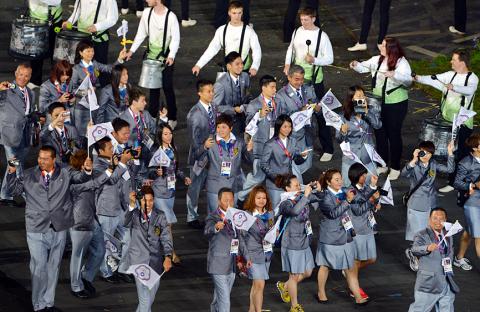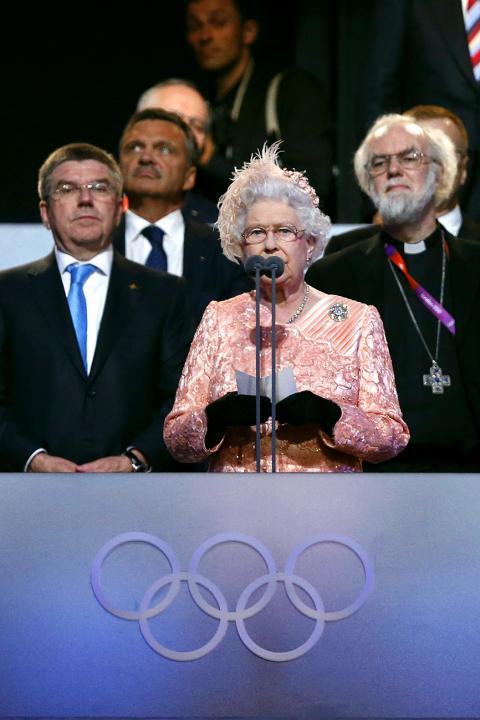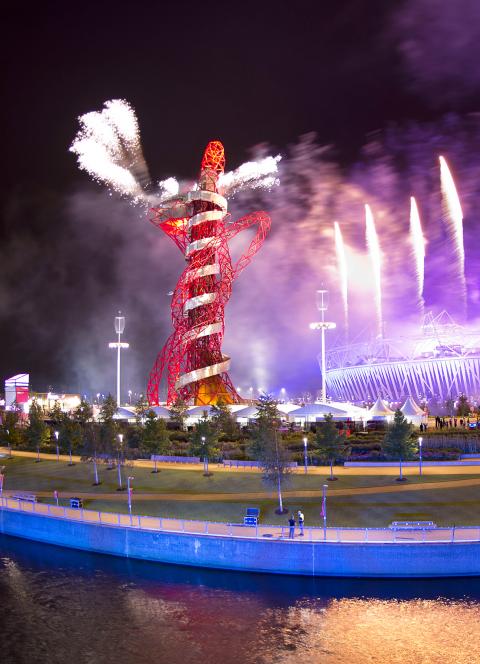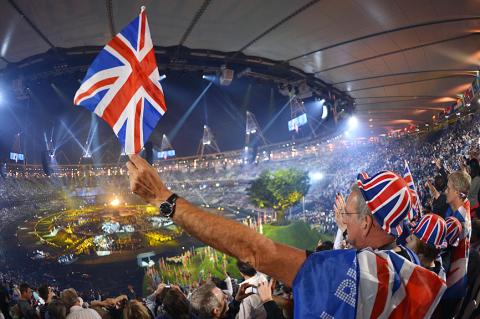Shaken and stirred.
James Bond and Queen Elizabeth II making her film-acting debut teamed up on Friday night to give London a wild Olympic opening like no other.
Creative genius Danny Boyle turned the Olympic Stadium into a juke box, cranking up world-beating rock from The Beatles, the Rolling Stones and The Who to send the planet a message: Britain, loud and proud is ready to roll.

Photo: AFP
To kick off a 17-day festival of sports, this was brilliant and cheeky. Now over to you, athletes.
Queen Elizabeth II, playing along with movie magic from director Boyle, provided the highlight of the Oscar-winner’s high-adrenaline show. With film trickery, Boyle made it seem that Britain’s beloved 86-year-old monarch and its most famous spy parachuted into the stadium together.
Daniel Craig as 007, the queen, playing herself, and her royal corgis starred in a short movie filmed in Buckingham Palace.

Photo: AFP
“Good evening, Mr Bond,” she said before they were shown flying by helicopter over London landmarks and then leaping — she in a salmon-colored dress, Bond dashing as ever in a black tuxedo — into the inky night over Olympic Park.
At the same moment, real skydivers appeared as the stadium throbbed to the James Bond theme. Moments after that, the monarch appeared in person, accompanied by her husband, Prince Philip.
Organizers said it was thought to be the first time she has acted on film.

Photo: AFP
“The queen made herself more accessible than ever before,” Boyle said.
Boyle sprang another giant surprise by giving seven teenage athletes the supreme honor of igniting the Olympic cauldron. Together, they touched flaming torches to trumpetlike tubes that spread into a ring of fire and then joined elegantly to form the cauldron.
With a singalong of Hey Jude, Beatle Paul McCartney closed the spectacle that ran 45 minutes beyond its scheduled three hours.

Photo: AFP
The show never caught its breath, with a nonstop rock-and-pop homage to cool Britannia. The soundtrack veered from classical to irreverent. Boyle daringly included the Sex Pistols’ Pretty Vacant and a snippet of its version of God Save the Queen — an anti-establishment punk anthem once banned by the BBC.
The encyclopedic review of modern British music continued with a 1918 Broadway standard adopted by the West Ham soccer team, the Rolling Stones’ (I Can’t Get No) Satisfaction and Bohemian Rhapsody, by still another Queen, and other tracks too numerous to mention, but not to dance to.
The evening started with fighter jets streaming red, white and blue smoke and roaring over the stadium, packed with a buzzing crowd of 60,000 people, at 8:12pm.
Boyle, one of Britain’s most successful filmmakers, who directed Slumdog Millionaire and Trainspotting, had a ball with his favored medium, mixing filmed passages with live action to hypnotic effect, with 15,000 volunteers taking part in the show.
Actor Rowan Atkinson as Mr Bean provided laughs, shown dreaming that he was appearing in Chariots of Fire, the inspiring story of a Scotsman and an Englishman at the 1924 Paris Games.
Headlong rushes of movie images took spectators on wondrous, heart-racing voyages through everything British: a cricket match; the London Tube; the roaring, abundant seas that buffet and protect this island nation; and along the Thames, the river that winds like a vein through London and was the gateway for the city’s rise over the centuries as a great global hub of trade and industry.
Wearing his yellow winner’s jersey, newly crowned Tour de France champion Bradley Wiggins rang a 23 tonne Olympic Bell from the same London foundry that made Big Ben and Philadelphia’s Liberty Bell. Its thunderous chime was a nod to the British tradition of pealing bells to celebrate the end of war and the crowning of kings and queens.
The show portrayed idyllic rural Britain — a place of meadows, farms, sport on village greens and picnics — that then gave way to the industrial transformation that revolutionized the nation in the 18th and 19th centuries, the foundation for an empire that reshaped world history. Belching chimneys rose where only moments earlier live sheep had trod.
The Industrial Revolution also produced terrifying weapons, and Boyle built in a moment of hush to honor those killed in war.
“This is not specific to a country. This is across all countries and the fallen from all countries are celebrated and remembered,” he said.
“Because, obviously, one of the penalties of this incredible force of change that happened in a hundred years was the industrialization of war, and the fallen,” he said. “You know, millions fell.”
The parade of nations featured most of the roughly 10,500 athletes — some planned to stay away to save their strength for competition — marching behind the flags of the 204 nations taking part.
Greece led, as the spiritual home of the games, and Team Great Britain was last, as host. Prince William and his wife, Kate, joined in thunderous applause that greeted the British team, which marched to the David Bowie track Heroes.
A helicopter showered the athletes and stadium with 7 billion tiny pieces of paper — one for each person on Earth.
Bahrain and Brunei featured female flagbearers in what has been called the Olympics’ Year of the Woman. For the first time at the Games, each national delegation includes women, and a record 45 percent of the athletes are women.
“This is a major boost for gender equality,” said International Olympic Committee president Jacques Rogge.
Rogge honored the “great, sports-loving country” of Britain as “the birthplace of modern sport” and he appealed to the thousands of athletes assembled before him for fair play.
“Character counts far more than medals. Reject doping. Respect your opponents. Remember that you are all role models. If you do that, you will inspire a generation,” Rogge said.
The queen then said: “I declare open the games of London, celebrating the 30th Olympiad of the modern era.”
Former world heavyweight boxing champion and 1960 Rome Olympic gold medalist Muhammad Ali was cheered when he appeared briefly with his wife, Lonnie, before the Olympic flag was unfurled.
About 8,000 torchbearers, mostly unheralded Britons, had carried the flame on a 70-day, 14,800km journey from toe to tip of the British Isles, whipping up enthusiasm for a US$14 billion Olympics taking place during a severe recession.
The final torchbearers were kept secret — remarkable given the scrutiny on these, the first Summer Games of the Twitter era.
Boyle’s challenge was daunting: To be as memorable as Beijing’s incredible, money-no-object opening ceremony of 2008, the costliest in Olympic history.
“Beijing is something that, in a way, was great to follow,” Boyle said. “You can’t get bigger than Beijing, you know? So that, in a way, kind of liberated us. We thought: ‘Great, OK, good, we’ll try and do something different.’”

Right-wing political scientist Laura Fernandez on Sunday won Costa Rica’s presidential election by a landslide, after promising to crack down on rising violence linked to the cocaine trade. Fernandez’s nearest rival, economist Alvaro Ramos, conceded defeat as results showed the ruling party far exceeding the threshold of 40 percent needed to avoid a runoff. With 94 percent of polling stations counted, the political heir of outgoing Costa Rican President Rodrigo Chaves had captured 48.3 percent of the vote compared with Ramos’ 33.4 percent, the Supreme Electoral Tribunal said. As soon as the first results were announced, members of Fernandez’s Sovereign People’s Party

EMERGING FIELDS: The Chinese president said that the two countries would explore cooperation in green technology, the digital economy and artificial intelligence Chinese President Xi Jinping (習近平) yesterday called for an “equal and orderly multipolar world” in the face of “unilateral bullying,” in an apparent jab at the US. Xi was speaking during talks in Beijing with Uruguayan President Yamandu Orsi, the first South American leader to visit China since US special forces captured then-Venezuelan president Nicolas Maduro last month — an operation that Beijing condemned as a violation of sovereignty. Orsi follows a slew of leaders to have visited China seeking to boost ties with the world’s second-largest economy to hedge against US President Donald Trump’s increasingly unpredictable administration. “The international situation is fraught

MORE RESPONSIBILITY: Draftees would be expected to fight alongside professional soldiers, likely requiring the transformation of some training brigades into combat units The armed forces are to start incorporating new conscripts into combined arms brigades this year to enhance combat readiness, the Executive Yuan’s latest policy report said. The new policy would affect Taiwanese men entering the military for their compulsory service, which was extended to one year under reforms by then-president Tsai Ing-wen (蔡英文) in 2022. The conscripts would be trained to operate machine guns, uncrewed aerial vehicles, anti-tank guided missile launchers and Stinger air defense systems, the report said, adding that the basic training would be lengthened to eight weeks. After basic training, conscripts would be sorted into infantry battalions that would take

GROWING AMBITIONS: The scale and tempo of the operations show that the Strait has become the core theater for China to expand its security interests, the report said Chinese military aircraft incursions around Taiwan have surged nearly 15-fold over the past five years, according to a report released yesterday by the Democratic Progressive Party’s (DPP) Department of China Affairs. Sorties in the Taiwan Strait were previously irregular, totaling 380 in 2020, but have since evolved into routine operations, the report showed. “This demonstrates that the Taiwan Strait has become both the starting point and testing ground for Beijing’s expansionist ambitions,” it said. Driven by military expansionism, China is systematically pursuing actions aimed at altering the regional “status quo,” the department said, adding that Taiwan represents the most critical link in China’s